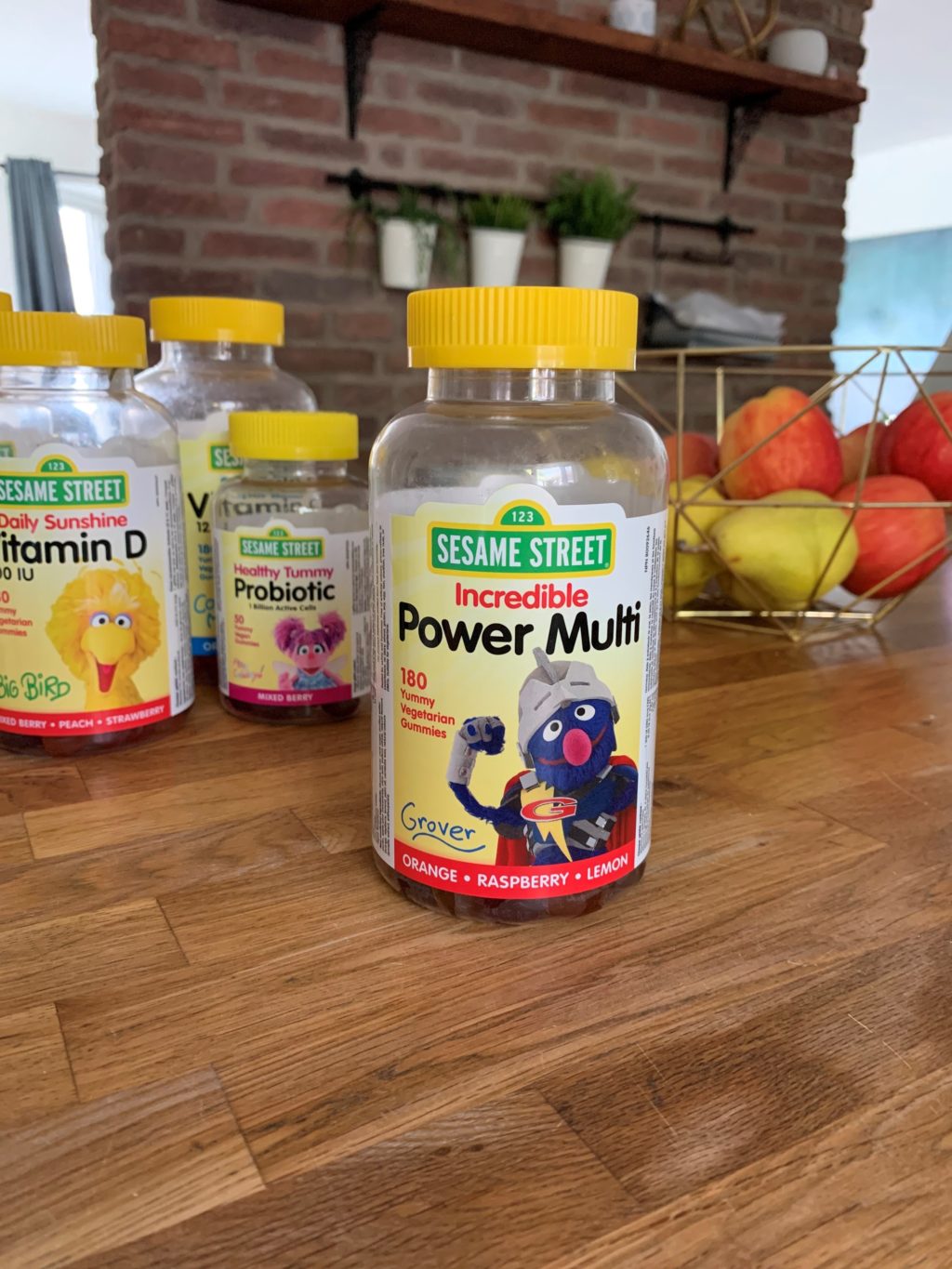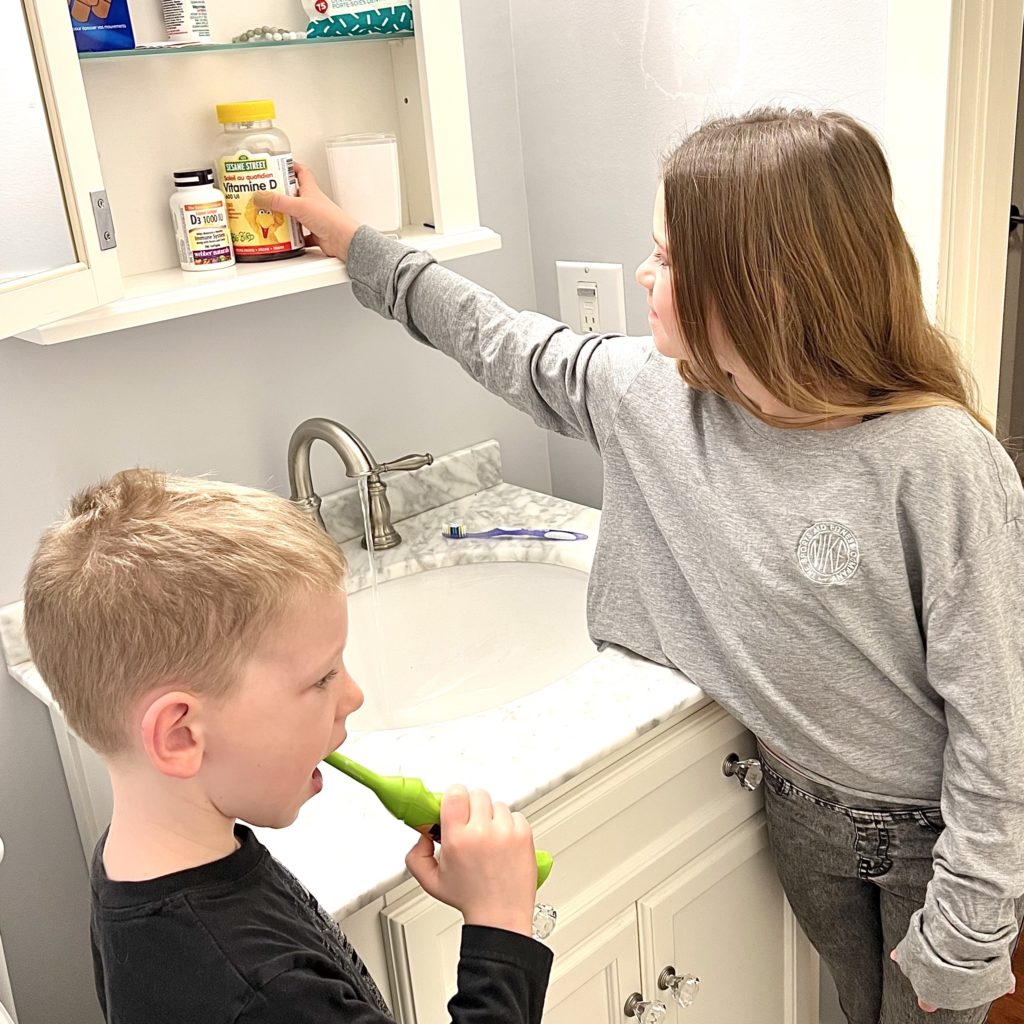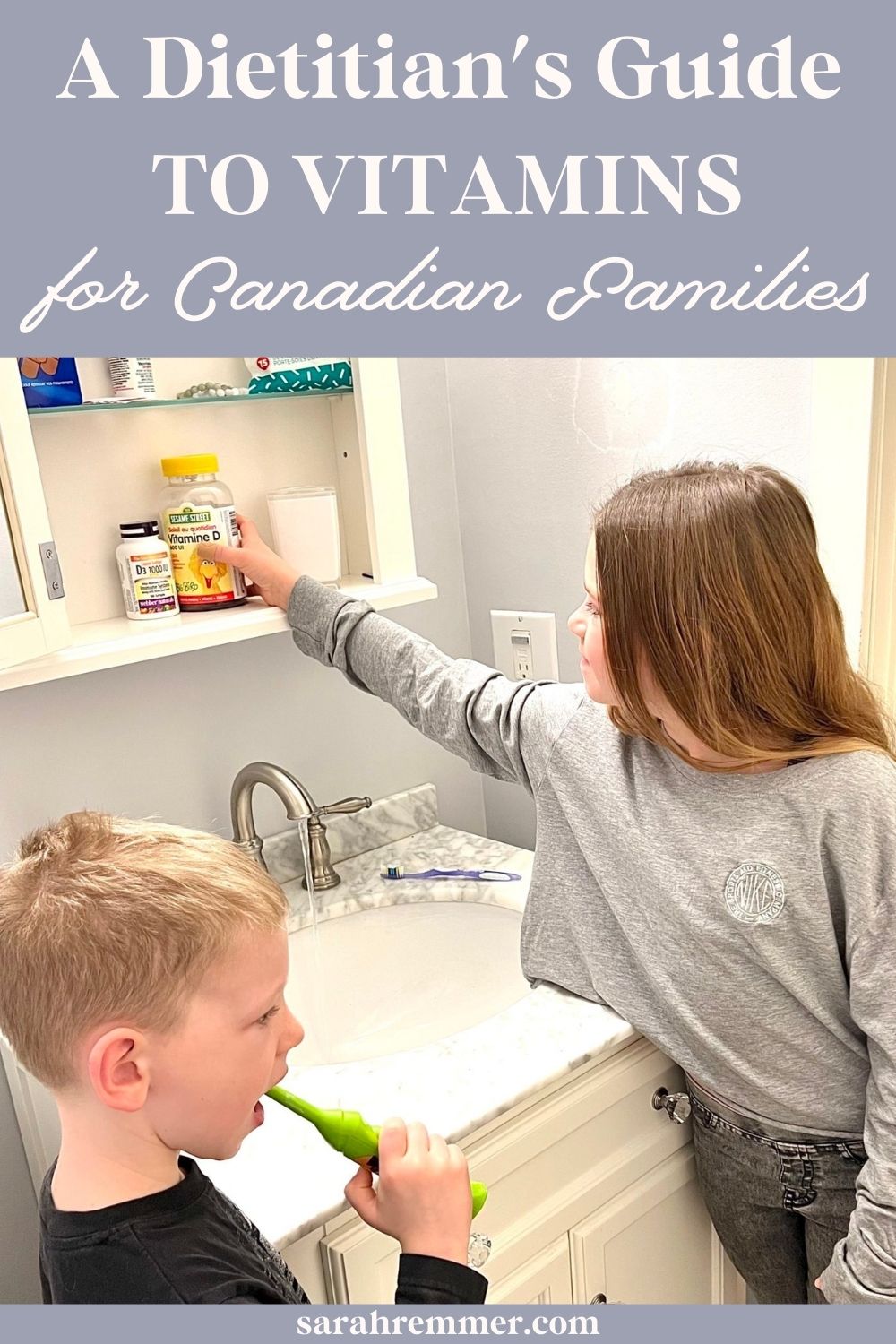Do you need a multivitamin or other nutritional supplements? Here’s everything you need to know about nutrition supplements for your family, including kids, such as multivitamins, vitamin D and omega-3.

This post was written in paid partnership with Webber Naturals. As always, all opinions are my own.
Some of the most common questions I get as a family registered dietitian are; “Are multivitamins necessary?” or “Do I need to be taking a vitamin D supplement daily?” or “How do I know if my kids need an omega-3 supplement?”
More than ever, people are seeking information on how to support their immune systems. Supporting a healthy immune system involves many lifestyle factors, such as getting enough sleep, proper hygiene, staying active and consuming a nutritious diet. But the truth is, our eating and lifestyle habits have been anything but “normal” over the last couple of years, which is understandable given the very “abnormal” global situation.
There are also families who follow vegetarian or vegan diets, or people who are dealing with food allergies or intolerances; both situations that likely warrant additional nutrition supplementation. Oh, and let’s not forget about picky eating (I’m not just talking about kids here!)—another reason to consider supplementation.
Supplement overwhelm?
It can feel really overwhelming to navigate the sea of advice and information out there on supplements (not to mention the plethora of brands and products to choose from). There are many differing opinions and lots of misinformation out there. If you’re curious to know which nutrition supplements to take (and that your kids should take) from a reputable source (a registered dietitian!), read on. I’ve got you!
Here’s what I’ll cover in this post:
- When to use nutritional supplements
- The sunshine vitamin: Vitamin D
- Why I recommend omega-3 fatty acids
- Multivitamins – Are they necessary?
As a Registered Dietitian, I can tell you that it’s not as difficult as you may think to meet your nutritional requirements by the end of the day (or week) through food, with the exception of a few key nutrients, such as vitamin D and omega-3.

When to Use Nutritional Supplements
First and foremost, eating a well-balanced, nutritious, mostly plant-based diet, full of whole foods like fruits, veggies, protein-rich foods (beans, lentils, lean meat and poultry, fish, eggs, nuts and seeds), whole grains and healthy fats is absolutely key. Supplements cannot and should not replace the nutrients that come from nutritious foods, as they work synergistically together to provide a wide variety of health benefits. In saying this, as mentioned above, our schedules and eating habits can be unpredictable, so supplementing with some key nutrients might be necessary. There are also some essential nutrients where the daily recommended intake cannot be met through food alone (such as vitamin D!), which I will talk more about below.

My go-to brand for our family’s vitamins and supplements is Webber Naturals, for many reasons, including the fact that they carry supplements for the entire family. For example, with their vitamin D line, Webber covers the entire age trajectory – from infant (Baby D drops), to kids (their Sesame Street Vitamin D Gummies) to adults (gummies, gel caps, drops and tablets).
Learn more about how to get your hands on these nutrition supplements in this post on Vitamin D.
Below, I break it down for you—nutrient by nutrient and supplement by supplement—explaining why each is important, the best sources, and how much everyone in your family needs.

Vitamin D
We all know that breastfed babies require vitamin D3 supplements, but what many parents don’t realize is that toddlers and kids continue to require a supplement past their first birthday. In fact, the recommended amount of vitamin D jumps from 400 IU to 600 IU after the age of one. And if you consider that one cup of milk only contains about 80-100 IU of vitamin D, you’ll realize that it’s almost impossible for your child to meet his or her requirements through food alone.
How much vitamin D does your child need?
Other food sources of Vitamin D include fish, egg yolk, milk alternatives such as soy and margarine, but even with these, your child will still need a supplement of 400-600 IU per day, regardless of if they are a picky eater or not. Vitamin D is important for bone growth (calcium absorption) and immune health. Read more about the importance of vitamin D for kids, and why I choose Webber Naturals’ Sesame Street vitamin D gummies for my kids. If you have wee ones, their Baby D drops are what I recommend until age one.
How much vitamin D does an adult need?
When it comes to adults, I recommend between 1,000-2,000 IU per day (I take 2,000), even though our recommended daily intake is 600 IU per day, and most health experts agree on the higher dosage. Because we live in a colder, Northern climate (do you see your breath for half of the year like me?) you won’t be receiving enough from the sun (in fact, no one will if they are covering up and wearing sunscreen…like they should!). And again, it’s almost impossible to get enough through food alone (to put this into context, you would need to drink 10 cups of cow’s milk per day to reach 1,000 IU of Vitamin D!), so it’s best to just make a vitamin D supplement part of your daily routine. As mentioned before, my go-to is the Webber Naturals adult gummies (they each contain 1,000 IU and I take two per day).

Omega-3 Fatty Acids
Some acronyms you will see below:
- DHA: Docosahexaenoic acid
- EPA: eicosapentaenoic acid
- ALA: alpha-linolenic acid
DHA AND EPA
I’m sure you’ve heard of the importance of omega-3 fatty acids, for both kids and adults! Omega-3 fatty acids is an umbrella term for a few different fatty acids, and these are essential nutrients (meaning that we need to get them through food and/or supplements) for proper health. The two most important types of omega-3 fats are called DHA and EPA, (these are found in oily fish). Omega-3s are important for proper brain, eye and nerve development, as well as cardiovascular health. DHA and EPA are found mainly in fish and seafood such as salmon, low mercury tuna such as skipjack or yellowfin, herring, Atlantic mackerel, and rainbow trout. Some eggs contain DHA as well.
ALA
This form of Omega-3 is found in walnuts, chia, flax, hemp, soy oil, and supplements. ALA does not have the same health benefits for brain, eye and nerve development as DHA and EPA do, but some ALA is converted to DHA and EPA in the body (researchers suggest that less than 1% of ALA is converted to physiologically effective levels of EPA and DHA) but this number may be higher in vegetarians and vegans.
In order to meet our omega-3 requirements through food, it’s recommended to consume 2-3 servings of oily fish per week. For some of us, it might be easy! But if you’re not a fan of fish or if you have an allergy, it might be more difficult. The good news is you can get it through omega-3 supplements (there are toddler and child versions too!). Webber Naturals has a great lineup of omegas and fatty acids – I recommend their Omega-3 Double Strength 600 mg EPA/DHA.
Amounts to take
There isn’t a gold-standard recommendation on how many milligrams of DHA and EPA children and adults should take in supplement form, but most health experts agree that children should take between 100-150 mg per day of DHA and EPA combined. For adults, a supplement of 1,000-1,500mg of DHA and EPA combined per day would be what’s recommended if oily fish is not consumed.

Multivitamin / Mineral Supplements
Many families choose to take a multivitamin supplement daily, to “top up” their daily vitamins and fill nutritional gaps. And there’s really nothing wrong with this! Even though a daily multivitamin isn’t always necessary (especially if you eat a wide variety of nutritious foods every day), it certainly won’t hurt, as most individuals (including myself) find it hard to eat a perfectly optimal diet every single day. It might also be necessary to top up key nutrients if your child is going through a picky eating phase or is not eating optimally for a prolonged period of time. Same goes for you – if you feel as though you’re not meeting your daily requirements of key nutrients (you’re not getting enough fruits, veggies, and whole grains), then it might not be a bad idea to supplement with a multivitamin and mineral supplement.
What do multivitamins contain?
Multivitamins contain important nutrients for growth and development, such as B vitamins, vitamin A, vitamin C and more. B vitamins help with metabolism and energy (these are naturally found in animal products such as meat, eggs and dairy, as well as nuts, beans and soybeans). Vitamin A is important for normal growth and promotes healthy skin and eyes, immunity, and tissue and bone repair (natural food sources include yellow and orange vegetables, milk, cheese and eggs). Vitamin C is an important antioxidant that helps to support immune function, production and repair of collagen, muscle and other tissues, as well as wound healing.
Another reason I love Webber Naturals is because they have multis for you and your kids. I recommend the Sesame Street Power Multi for your kids and the Webber Naturals Multi Vitamin for adults.

Some Other Considerations for Vitamins
Children and adults who follow vegetarian or vegan diets may need to supplement with not only vitamin D and omega-3, but also nutrients such as iron and vitamin B12, since these are largely found in animal-based foods. And those who have celiac disease are at a higher risk for nutritional deficiencies and may need additional nutrition supplements too. Children (and adults) who have a persistent poor appetite, extreme picky eating patterns, take certain medications or have chronic medical conditions that interfere with food intake may need a supplement as well. If this is the case, it’s best to speak to a qualified health care provider (family doctor and/or registered dietitian) to put together a tailored plan for supplementation.
Discuss supplements with your health care provider (such as a family doctor, pediatrician or registered dietitian) before taking them or giving them to your child. Taking large amounts of vitamins that exceed the recommended daily amount can be toxic and lead to symptoms such as nausea, headaches or diarrhea (this is a thing!). So, please always store supplements out of reach from children.








![[AD] It’s Day 6 of my 15-Minute Supper Series and today we’re putting a delicious twist on a classic BLT to make it nourishing and meal-worthy 🤤
Make sure to comment “Spud” and I’ll send you my top dietitian tips for feeding your family on busy weeknights along with a huge list of meal ideas!
This pasta salad takes no time at all to throw together and has everything you need for a nourishing meal. I always make extra bacon for things like this, but if you don’t have any cooked bacon I find cooking it in the airfryer or stovetop the quickest 🥓
I find that this salad lasts 2-3 days in the fridge without getting too soggy. You can also add in fresh lettuce to crisp it up or add the dressing when you eat it.
I ordered all of my groceries from @spuddelivers, which always saves me time and effort and gives me peace of mind knowing that I’m using high-quality, local and sustainable ingredients. I love that they come straight to my door the day after ordering 🙌🏻
Let’s make it!
Ingredients:
* 10 slices bacon cooked and diced
* 12 ounces pasta cooked and cooled
* 1 cup homemade Ranch dressing
* 1 ½ cup baby tomatoes diced
* ½ avocado diced
* feta
* ⅓ cup red onion diced
* 1 cup romaine lettuce
* fresh parsley for garnish optional
Homemade ranch dressing:
* ¾ cup mayonnaise
* ½ cup sour cream or Greek yogurt
* ½ teaspoon dried chives
* ½ teaspoon dried parsley
* ½ teaspoon dried dill weed
* ¼ teaspoon garlic powder
* ¼ teaspoon onion powder
* Salt and pepper to taste
Make it:
1. Blend all Ranch dressing ingredients together in a small blender (or whisk by hand) and set aside.
2. In a large bowl assemble the pasta, tomatoes, avocado, cheese, red onion, lettuce and bacon.
3. Pour the dressing over and toss to combine.
4. Garnish with parsley and serve.
You are going to LOVE this meal-worthy salad, I promise!
Comment SPUD to receive my top dietitian-approved tips for feeding your family during the week, a long list of ideas, and a curated shopping list with all of the ingredients for this recipe + all of the other ideas that I share in this resource!
#sponsored #spuddelivers #15minutemeals #whatsfordinner #easymealideas #dietitianapproved](https://www.sarahremmer.com/wp-content/uploads/sb-instagram-feed-images/438745920_798281295514125_2547899647147267180_nfull.jpg)
Leave a Comment